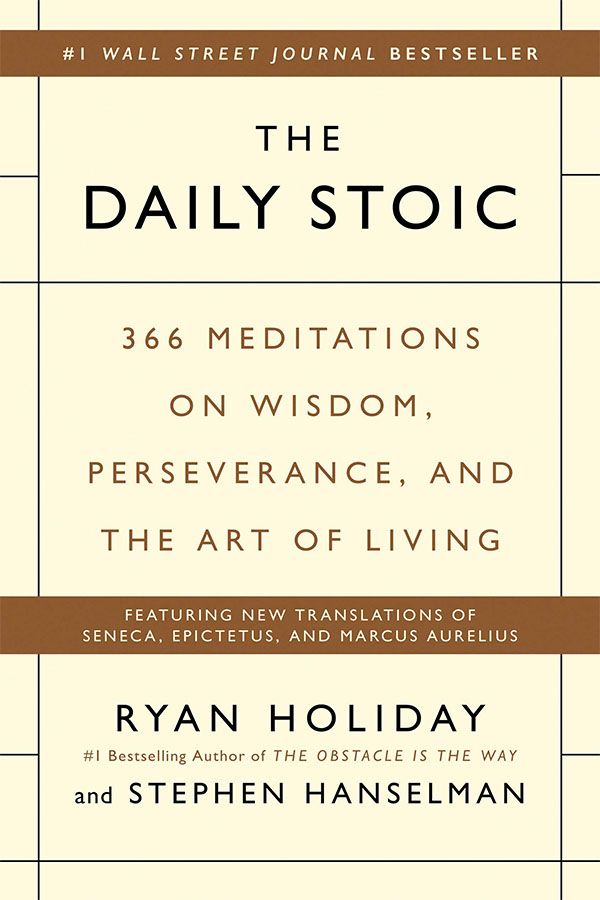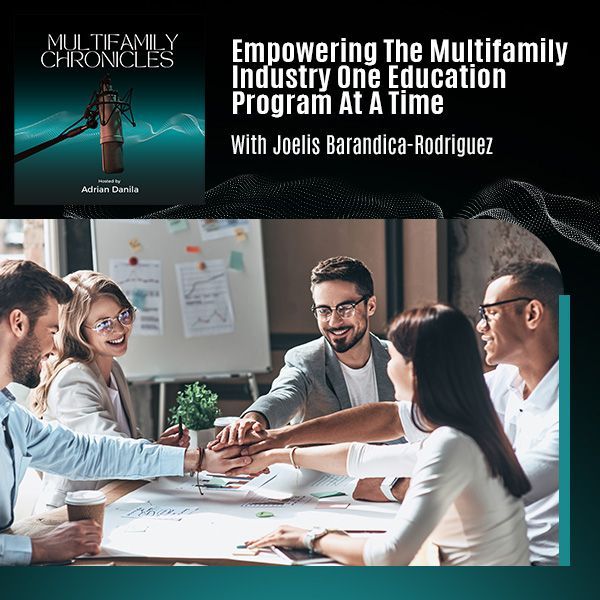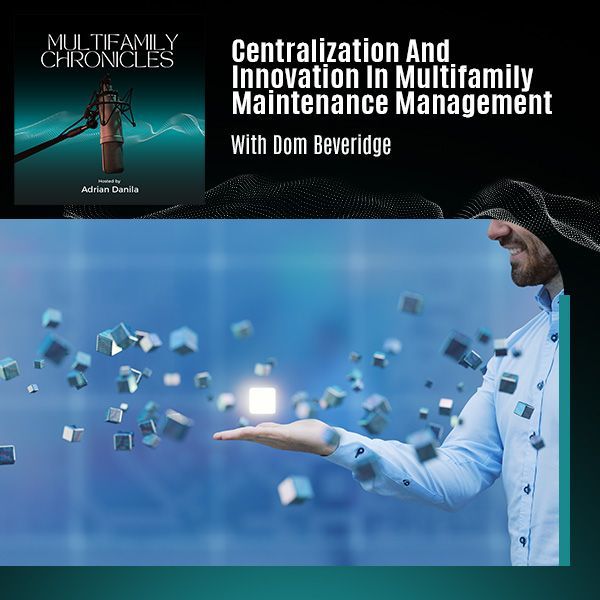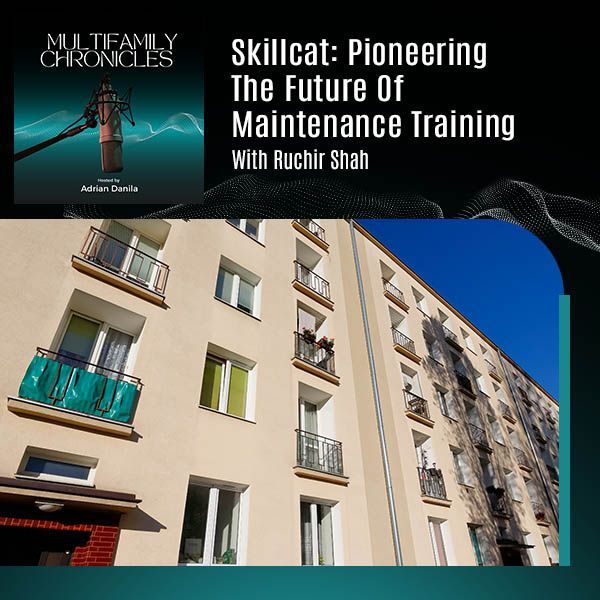Company Building From Scratch During The Pandemic With Jennifer Staciokas
When COVID-19 hit, businesses were forced to close their doors, some only temporarily while others for good. But in the case of Jennifer Staciokas and her team, they focused on company building even in the middle of the pandemic. She shares with Adrian Danila how they created Western Wealth Capital from scratch in 2020 while dealing with the Great Resignation, massive economic downturn, and unpredictable real estate trends. Jennifer explains how they managed to build a thriving community despite the risks and restrictions of COVID-19, as well as their strategies on recruitment, workplace culture, and employee training. She also discusses the importance of using failures as a springboard to improvement and having a constant learning mindset.
---
Watch the episode here
Listen to the podcast here
Company Building From Scratch During The Pandemic With Jennifer Staciokas
In this episode, my guest is Jennifer Staciokas. Welcome to the show, Jennifer.
Thank you so much. I'm so happy to be here.
Jennifer, you are the Executive Managing Director for property management at Western Wealth Capital. Please share with the audience a little bit about yourself, your background and what you're doing.
I'll talk a little personal and a little professional. I grew up on the East Coast. I went to school outside of Philadelphia and was a French major. I’m not utilizing my degree. I had the opportunity to study abroad in France for a year. I then went back to grad school for International Business and had the opportunity to study abroad in England for a summer. At that time is when I found a flyer in the elevator of the apartment building that I lived in outside of Washington DC that said, "Looking for a fun, enthusiastic people that want to save money on their apartment." I thought that sounds amazing. I'm going to grad school. I could save some money on rent. I went in, applied and got hired on the spot as a leasing professional.
I did that for a little bit of time and then got sucked into this industry as so many people do because I continued to get promoted. I started in leasing, moved to a resident manager, then got into my career of training, became the training coordinator, the training manager, the training director, got into marketing and then moved into corporate roles with Lincoln Property Company, with Pinnacle, which is now Cushman & Wakefield and held various positions that oversaw corporate marketing, property marketing, training, revenue management and anything that related to property performance.
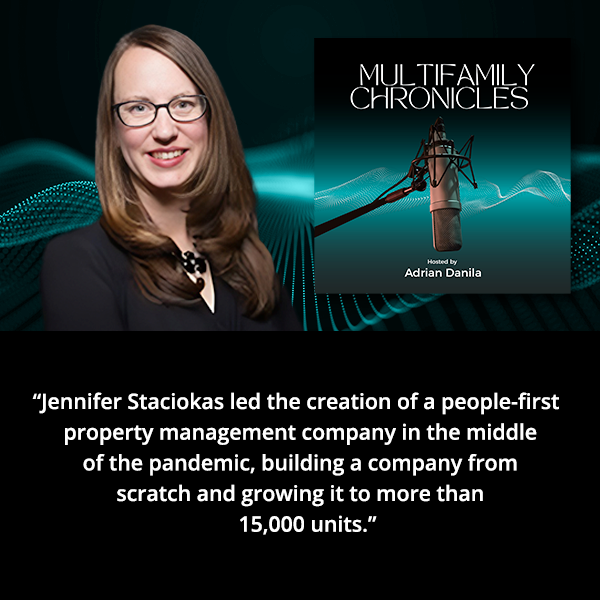
The opportunity came up with Western Wealth Capital, where they're an owner of properties and they were looking to bring property management in-house instead of using third-party providers. I was blessed to be able to be selected to build that property management company from scratch and I have been doing that for several years.
Something is very fascinating that you just said, building a management company from scratch. What are some great things to share about doing that? What does it feel like to build something? How many units is your company managing?
We have 59 properties in January of 2023. It's a little over 15,000 units. We've been onboarded since we started the management company with 60 properties. We've disposed of one at this point. For several years, we built a management company from scratch and onboarded 60 properties. I jokingly say this but it's not a joke. We've been building the plane while we're flying it. To reverse back, if you think about March of 2020, that's when I joined Western Wealth Capital, that's when the world locked down, shut down and COVID hit. I accepted this job in January 2020 knowing I was going to be starting in March and we thought that the world was going to be in a different place than it was.
We not only were building a management company from scratch but we were doing it through COVID. A lot of lessons were learned. We faced a lot of challenges because we didn't have the luxury of doing a lot of training in person. Even though our offices were still open and we had built what I call COVID walls so we could still interface with our customers, we didn't have that luxury of bringing large groups of people together for training. We had to get creative to onboard our properties, get the properties up to speed and get the employees so they felt comfortable doing their day-to-day.
Would you like to share a few instances and great lessons that you learned from building this amazing company? It's fascinating to me. I always wanted to be part of something like this and I have been throughout my career but to start and build it from scratch, it's amazing. What are a few things that you like to share or some extraordinary things about your journey?
Think of the end in mind. Where are you trying to get? Where I'm trying to get in 2 or 5 years is different than what I would've said in March of 2020. Think about the end goal of what you're trying to accomplish. You don't want to bite off more than you can chew looking. When I joined Western Wealth Capital and people heard we were building a management company, everybody wanted to be a part of that. All of the supplier partners that I had worked with in the past wanted to be part of our growth.
They knew at some of the other large companies that I worked at that I was a strong supporter and fan of their product. It made sense in our business but you have to prioritize, “What are the things that I have to have to operate a company and a property? What are the things that are on my wish list or I would like to have?” Map that out. That's exactly what we did. We documented the things that we needed to have so our residents could live in their apartments, pay their rent and we could do our books.
What are those things that would be nice to have that would positively impact our business but didn't need to have at the launch of the company? To summarize, prioritize everything. What is the end goal that you have in mind? I still have a couple of things on my list that I haven't been able to get to yet because other things had a larger priority over those things that we have been able to accomplish.
When you have too much on your plate, just focus on your end goal.
You're mainly on West Coast and Texas. For those of us following your company, when should we expect Western Wealth to come to East Coast? I'm an East Coast person so I wanted to know when we're going to experience Western Wealth communities on the East Coast.
Our goal is that hopefully by the end of 2023, we will have some Western Wealth communities under management. That's the goal. We're an owner in Atlanta but we don't manage those properties in-house at this point. The markets that we service are Houston, Dallas, Phoenix, Tucson and Las Vegas. Our acquisitions team is always looking for new markets and East Coast is on the radar.
I'm looking forward to seeing you guys grow your business on East Coast and in my backyard too. Jennifer, for someone with a stellar career like you had so far, what are some great pieces of advice or some things that you would like to share with someone that's looking at you and saying, "Wow. A person this high up in the hierarchy, how did she get here?" What are the things that helped you throughout your career to get where you are? What pieces of advice would you have for someone that wants to become an executive position like you?
Everybody's path is different. Some of it comes down to great timing but it also comes down to hard work and dedication. There's certainly a thing called luck. Luck will only carry you so far but it's deciding what is it that you want to do with your career and putting your mind to it. I'm a firm believer in manifesting what it is. If I have a goal in mind or something that I want to do, I'm going to put all of my positive thoughts and manifest that to try and make that happen. I have to put the work behind it to also show that that's going to happen. One other important thing that I always tell people is constant learning.
I am a voracious reader prior to joining Western Wealth because I don't have as much time in startup mode but I used to read a book a week. I would vary what types of books I would read. Some of them would be fiction and a no-brainer type of reading to take my mind off of maybe a challenging situation or week that I was dealing with. I would have non-fiction and business books that I would read, whatever they may be. Constantly growing and learning also helps grow your vocabulary. There's a lot more conversation that can come when you read. Now that I've been at Western Wealth, I do still read some books but not one a week.
I'm on LinkedIn and reading a lot of things about the industry and then other stuff that's outside of the industry to see how I can make myself better, bring those things into our organization and drive us and move us forward. Another thing I would say is to find either a direct or an indirect mentor. Sometimes people get a little taken aback when you hear the word mentor and they don't know what that means. It's like, "I'm not meeting regularly with somebody." You can have an indirect mentor. They may not even know it. You're looking at their actions, listening to their words, seeing how they carry themselves and it's something that you're emulating in your life.
It's also important to have the differentiator of having a sponsor so think about who's that person in your career that is going to be bringing up your name when you're not in the room. When I was a training coordinator or a training director, I wasn't in the executive room but I was fortunate enough to have a sponsor that took a chance on me. I was somebody that had worked on-site. They saw that I had a passion and drive for the industry and what I was doing and for helping people. They put me in a training role after six months that I had been in the industry and at the company that I was at. Somebody took a chance on me, put me in this role and became my sponsor.
They also were a mentor but there is a differentiator between a mentor and a sponsor. A mentor is somebody that's providing guidance and an outlet from that you can bounce ideas. A sponsor is somebody that is your advocate. They're helping to progress and move your career forward. They're the ones that are in the room when you're not invited to the room to make sure that you are going to be tapped for that next opportunity. I was very fortunate in my career to have a sponsor. It also comes down to success in this industry is all about building relationships.

It is so very important that you build relationships not just within your organization or department but across the industry at competitor companies, with supplier partners, with your investors or your owners, that you're a trusted resource. When they have a problem, an issue or something that needs to be solved, they say, "Let's call Adrian or Jennifer because I trust them. I know that they have the answer."
Jennifer, one of the things that you mentioned is reading. Would you like to share with the audience some of your favorite books that you read, fiction and non-fiction titles?
Something that I read every day, every year is called The Daily Stoic. You read one page a day and it's a different passage. Each month has a different category that they're going to focus on and then each day has a message for that category that you're focusing on. I've been reading that for years. It always sits next to the nightstand next to my bed. Every morning when I wake up, I read my passage. It's interesting because anybody that has picked up The Daily Stoic or will pick it up, those messages often come to you at the right time. You don't realize how much you need to be reminded of a message. Even though I've read that book for several years, I’m constantly relearning. It's a validation of something you may have in the back of your mind but you just don't know.
It's a good reminder of how to lead your day and encourage and influence other people. That same author writes a whole host of books, which I love, The Obstacle Is the Way, which is a great book, Ego is the Enemy, Stillness Is the Key and Courage is Calling. All of those books tie into the stoic principles. They're great reminders and refreshers. I've read several of them multiple times over. It depends on where you are in your life and what you're open to receiving at that time for what you'll get out of that book or passage.
From a fiction perspective, one of my absolute favorite books is The City of Fallen Angels. It's set in Venice. It's the same author that wrote Midnight in the Garden of Good and Evil, which is also a tremendous book. I could go on and on with books. It's something as a child I always enjoyed doing. I remember during the summer, going to the library and picking up my books every week and digging into them.
Company culture is one of the subjects that I'm very passionate about. When you build a company, the culture comes with it. I'd like to ask you, Jennifer, what are a few great things happening at Western Wealth? For someone looking from the outside in and a career opportunity, why Western Wealth? What makes your company different? Why do you think that Western Wealth could be the answer for someone looking from the outside in?
A couple of different things. Some exciting things are happening. We are still in startup mode. We’re building the plane while we're flying it. We onboarded 60 properties in 2 years. We have a little bit of a slow time where we don't have as many acquisitions and that's our opportunity to go back and reevaluate all the processes, procedures and policies that we put in place over these past several years, make sure we tighten all of that up.
It's important too that you can't make those decisions in a vacuum but you have to get the input and the feedback from your onsite teams, the people that make it happen, the ones that implement and execute what you're putting into place so asking them their opinions and finding out what we can do to make the organization better.
One of the ways we did that is by implementing an employee engagement platform through Swift Bunny. We are able to listen to what our employees are thinking and feeling at various touchpoints without their time with us. We've gone through our baseline survey. We've also completed our first quarter review. We take it seriously. We don't just want people to feel like they're taking a survey and then nothing happens. You take the survey, feel like you gave all this great feedback and then never get any follow-up.
We've been dedicated to when we survey people and when we have these touchpoints that we go back and we evaluate what our employees are saying and then make sure that we put an action plan together and communicate that action plan to our employees so they understand that we heard them, were listening and making changes. We also do let them know that we're not going to be able to act on every single recommendation or piece of feedback that they give but we have to look at the things that are either pervasive across the entire platform or things that we know that are going to move the needle. Maybe it's things that we overlooked or didn't think of at the time.
We put those action plans together. We hold an all-hands call with every single employee and then follow up in writing so everybody knows what the plan is and they can hold us accountable for it. Something else we've been focused on is training and building up our platform. Throughout COVID, everything was being done on teams. There would be some one-on-one training. We're getting to a point where I've got a team of three. They're able to go to the properties and host meetings in the cities where we operate and give people one-on-one or group training to move forward in their careers.
The good thing with COVID that came out of it is it accelerated our technology adoption in this industry by light years. It also accelerated how we're going to look at training moving forward so understanding that every learner learns in a little bit different way. Some people want to sit in a classroom for eight hours. For some people, the thought of that gives them anxiety. Some people want to have in-time learning where they're able to look at a video for a particular task that they need to do and within 90 seconds, they can get the information that they need. We've been able to branch out and offer multiple different ways for people to get the information that they need to be successful in their job, either through job aids, videos and in-person training or group training.
The COVID-19 pandemic helped many businesses accelerate their technology adoption by light years.
You mentioned starting the company right when COVID hit. We're talking about building something brand new from scratch to about 15,000 units. You have COVID, labor shortages and the Great Resignation. You have to build a company from 0 to 15,000 units. That takes quite a few people to run that company, service the residents and oversee everything, including operations. How did you overcome all those obstacles? What are some pieces of wisdom that you have to share with the audience? How did your company overcome all these tremendous challenges? They're still around like labor shortage, especially maintenance, which is the biggest headache and reason for all of us in the industry losing sleep.
I'll explain in detail because most people will give the same answer. It all comes down to the people. What I mean by that is hiring the right person to sit in the right seat and also set the right expectations with employees. When you're building a company from scratch, it's a startup. The level of intensity in a startup is very different from a stabilized company. When you're interviewing people, it's important to talk about the good, the bad and the ugly and lay a good foundation for what it is that you're looking for and what the expectations are going to be. The startup environment is not an environment that's meant for every employee.
If you're hiring employees that are used to a very structured environment that already has policies and procedures and systems and technology that's in place, it can be extremely disruptive for an employee to come in, have to roll up their sleeves and help build that. What we've found is that has been a challenge and spending time on the front end, making sure that we're finding the right candidates that fit the environment for what we're looking for. I know you've had Thu Van on your show previously and I always like to say that she's my secret weapon.
When we were building the company, we knew as an organization we wanted to be a people-first organization. If you say you're going to be people-first, that means you have to put your money where your mouth is. If you're going to say you're people-first, you've got to hire the right people to make sure that they're hiring the right people. Thu Van was one of my very first hires. We hired recruiting before we hired HR and a lot of other things. We prioritized that. We knew we wanted to grow from 0 to 60 properties so that means there was a lot of people capital that needs to be involved in that.
When people talk about asking me what I do, I don't say that I run a property management company. That's one piece of what I do. I run a staffing agency and a technology company because that is how we differentiate ourselves. I have 15,000 units but we have a team of 4 in recruiting because we have constant acquisitions that are coming in. We're constantly hiring new employees. With the Great Resignation and labor shortages, there's been a little bit more turn than there had been previously in our industry so our recruiting team is constantly staying focused and busy.
They do a fantastic job of taking something that can be extremely time-consuming and the most important task that we have for our onsite teams, take that out of their hands and do all of the pre-screening and the vetting and then provide the top candidates for the hiring manager to meet with to make the best decision for their property. That has been something that has set us apart. Make sure that what you're saying on your website or social media falls in place with the actions that you're taking so the people that work for you say, "What they told me was going to happen and what they told me the company stands for is happening."
We've been able to see that because many of our employees are posting their experiences on social media and tagging us. We're not asking them to do that but it's because they've bought into the mission, the vision and the culture, which I never answered your culture question so I'll dig into that a little bit, too. Employees need to understand what's expected of them so then they can give their best when they come to work. From a cultural perspective, when you're building a brand new company, there are a lot of people that will say different things about the culture. I am a firm believer that I certainly set the tone as the leader of the organization but I am not the full driver of the culture of this organization.
I can provide an environment where the culture can grow, flourish and expand but it has to come from all levels of the organization. Every single employee is the one that's building the culture of what Western Wealth communities are and I never take that for granted. That's why we did implement the employee engagement platform so we can hear what our employees are saying and take swift action. We have a couple of what we call our hashtag culture. We have four different hashtags and I'll quickly go through those. Anybody that follows us on LinkedIn, Facebook or Instagram may see a lot of our hashtags and you probably wonder what they mean.
Leaders set the tone of the entire organization, but they are not the full driver of its culture. Every single employee is part of the whole community-building process.
The first one is BSU and the polite version of that is Blow Stuff Up. We like to do things differently. Just because people in our organization does it that way doesn't mean that we need to do it that way. Let's look at things differently. We also have one WGYB, which is We've Got Your Back. We've got each other's back through thick and thin. That was most important during COVID when so many people were sick either within our organization or their families and we needed to take care of each other. With that, we host a We've Got Your Back event every year where we give backpacks out to every single child that lives in our communities prior to the school season.
Two others are WDW, which is We Don't Wait. It means we don't wait for somebody to tell us what to do. We take the initiative and get it done. Last but not least is TMV, which is That's My Village. Our CEO was accepting an award for Entrepreneur of the Year. In her speech, she had people in the audience and she said, "This award is not for me. It's for my village." That's where That's My Village came about because no one person can make a company run or succeed. It is the village that makes the company run. If one of us succeeds, all of us succeed. If one of us fails, all of us fail together.
One of the things I'm passionate about and this is my original background is maintenance management. As an industry, if we are to be very honest and genuine about what's happening, our service personnel, service managers or maintenance managers are locking the management and financial part training in the industry in general. Some companies are doing a better job than others. Let's be honest about that too. Let's be specific. Overall as an industry, we're behind on that. Do you agree with the statement?
I do, yes.
I want to hear from you, Jennifer. What would be some things that we could do to address to improve the situation, if you have some thoughts on this?
Oftentimes, when people are going to the properties, they go directly to the property manager and that's where a lot of the focus takes place. It's so important when you or I go on the property to spend time with every single person because you get a different perspective and hear different things about what's happening well and what's not happening so well. From a maintenance team perspective, it's important for them to understand the why of what they do. What is it that they're bringing to the table? What impact do they make positively or negatively in some cases so they do understand how important their role is?
If something with maintenance isn't going well, that's a trickle-down effect. It can impact ratings and reviews. It can impact renewals, the value of the property and what the property can trade for when it's being sold. You can never undermine that. One thing that we try to instill in our teams is understanding the value of a dollar. For instance, depending on what cap rate you're looking at but if you've got $1 of expenses that you're saving or income that you're generating, that can sometimes equal $250 worth of value.

When you start thinking about an improvement that maintenance does to save money at the property, it's not going to be a dollar. It's going to be maybe thousands of dollars. When you times that by $250, the value that you're creating at that property from a maintenance technician or a maintenance supervisor, their impact is enormous. It's so important for them to understand that impact. When they're making decisions and when they understand the why is when it clicks in. It's so important that the property manager and the maintenance supervisor need to be in lockstep.
They need to be huddling every morning and strategizing about the property, what needs to take place and making sure that the maintenance supervisor understands the budget and understands what spending they have authority to make and what they need to collaborate with the manager on because it does impact the property's performance.
Without the why, in general, you would never get a buy-in. If you tell someone you have to do this but you don't put any type of reason behind it why they should do it, how are you going to get buy-in?
It won't happen.
People might do it because it's the job and they might feel like they're losing their job if they're not doing it. If you put reason behind it and you make them understand why, you're going to have them as a partner along the way. They're going to feel like they're part of something bigger than themselves, this mission, this thing and I understand what that is. A lot of times, we might be telling them this is a big project but then we don't detail. It's so important that we get this part to get them to buy in and also to make them feel like they're part of something. They're not just somebody working at a property.
They're a very important part of the whole team. The way they perform is going to dictate how successful this deal and business we're running. Without them, performing at the highest level, then the property, the business is not going to turn in the biggest profit. I truly love that. We all talk about success stories like yours. It's an amazing thing how many things you have accomplished throughout your career. What we typically don't talk about in society, in general, is failure.
How did we get this? This is not a linear trajectory. It's not like an arrow shooting. You start from here and everything's like this. It's more up and down. Sometimes you hit the rock bottom. It's very important to bring in failures, what we learned from them and what the lessons were. My next question to you is how did an apparent failure set you up for future success?
I certainly make mistakes every day. There are little and bigger things that happen. One thing that I do say is if you've ever watched the Ted Lasso series, I love his mentality with his team about the goldfish. The goldfish has less than ten seconds of memory as it relates to failures. What I always like to say when it comes to failure is you have to acknowledge the failure. I like to say I'm my worst critic. I will overanalyze what happened and nitpick everything that went down but then I quickly self-reflect and figure out what I could have done better in this situation, whom I could have involved in the situation so it wouldn't have happened and then how I can forgive myself and move on.
Create an action plan. We had a situation that came up. A couple of people on my team were extremely stressed. We weren't quite sure how we were going to get out of it. We came together as a team, started brainstorming on things and then worked with a partner that we had been working with. We came up with a solution that worked for everybody. We documented it and then started evaluating, “Let's do our debrief of the situation. How can we ensure that it doesn't happen again? What things are we going to put in place to make sure that we learned from the mistake that we made and then move forward in our process to document so it won't happen again?”
Once we've done that and done that successfully, we need to let it go, be the goldfish and not think about it and keep bringing it up. It's like when you're a child and your mom or dad brings up something that happened several months ago that you were scolded on or a friend or spouse brings up a situation that happened months ago. Nobody wants to be reminded of that. It is important that you can't brush it under the rug and act like it didn't happen. You do need to self-reflect and talk through with yourself what happened and how you can avoid it moving forward. Come up with a plan and a procedure so it won't happen again, forgive yourself and then let it go.

I love every single word of what you said. Use them as learning experiences, find accountability pieces, find a solution, move on, forget about it and put it behind. It's history.
There's a good topic there too thinking about getting out of your comfort zone. In my career, I've gone through different paths where I was on-site and then got into corporate roles with training. I took on marketing and revenue management. I'm overseeing a management company. I was telling a group of my employees before the show that there are so many days I sit in my office where I'm like, “I've never encountered this before. I'm out of my comfort zone but I'm going to roll up my sleeves and figure it out.”
I'm not just going to do it on my own. Our industry has a network of people that are so smart and willing to help anybody that I can send a text or pick up the phone and phone a friend and say, "I'm dealing with this situation. Do you have something that could help me with this? Can we bounce some ideas?” It’s everybody new in our industry or even if you're seasoned in the industry and haven't taken advantage of it. The key to my success is the relationships that I've built and the network that I have because it truly does take a village to be successful. No one person can know everything and know how to handle situations gracefully. We need each other to get through that and constantly use that network. If you allow people to utilize you for things, they will give it back to you tenfold.
Sometimes, it's not the same person. You help someone and it's like karma. If you do good, good things come back to you. It's not a transactional type of thing like networking. Most people fail because they fail to understand what networking is about. As you probably know, I'm extremely huge on networking. It's a job in itself for me. Every single hour that I have outside of work and my family, I spend on networking. There's a lot of value. I don't do it in a transactional way like I'm going to help you if you're going to help me or you owe me down the road. It never is that way. I'm so blessed with so many things that are good coming back at me. They're coming at me because I must have done something good to somebody. It's a pretty amazing thing.
Jennifer, I wanted to ask you, if you were to offer a few pieces of advice for someone young that's ready to start to go into real life, who just finished high school or college and never had a real job in their life or they were part-time during the school but they're facing real life, what are a few pieces of advice that you would like to share with them or tell them?
One of the things that I'm extremely passionate about is the opportunity of I had to study abroad on two occasions, in my undergraduate, as well as my graduate degree. To me, you grow by leaps and bounds. When you're taken out of your comfort zone of either living at home with your parents or living at your university, whatever it may be and you're put into a new environment where they speak a different language, where the currency's different. At the time when I went and lived in France, I didn't have a credit card. It also wasn't as mainstream at the time. I'm not going to tell you how many years ago but it was quite a long time ago.
I had my first credit card and I had to learn to budget my money. I had to be responsible for myself and show discipline and responsibility. For any young person that I ever have a chance to interface with and who wants to ask my advice, I recommend that they do some form of study abroad, be it either sometime in high school if you're taking a language. You can do it in college and graduate school. Being exposed to other cultures and other ways of life also opens your mind. You're less judgmental of other people. You embrace other cultures more and learn more things about yourself and other people.
I also learned to speak other languages. I learned more about speaking English by taking a foreign language than I did by going to school and taking English classes. You learn a lot about yourself. Also, when you're moving away from your family and you're out on your own, you have to build relationships, meet new people and learn how to function without the cushion of having your family or your friends that you've known for a long time. That's one of the biggest pieces of advice. Going back to our earlier conversation around learning, just because you finished high school or college and you think school's done, you should constantly be learning until the day you die.
Just because you finished going to school doesn’t mean you have to stop learning. You should try and learn something new every single day until you die.
You should try and learn something new every single day. Somebody that I worked with several years ago left something with me that was very inspiring to me. I was working for a third-party management company at the time. His advice to me was, “Anytime you go into a client meeting, you should always leave the client with something that they didn't know prior to the meeting. You should always educate them. Even if you're never going to get the management contract, you should go in and be a partner and educate and allow them to learn from you or your company. Leave them with some nugget of wisdom that when you walk out the door, they said, ‘That meeting was worth my time because I learned something from that interaction.’”
That was a valuable piece of advice. When I was working for third-party management companies and we were pitching business, I looked at that approach not as a sales process but as an education process and a way to build a relationship and build trust with a client in hopes that when you build that trust, that then turns into the sale.
That's excellent advice. Adding value. Why was I in this meeting for 15, 30 or 45 minutes? I came out of the meeting with something I didn't know before. That's an amazing and very powerful piece of advice. Jennifer, we're approaching the end of our conversation. Unfortunately, time is not on our side but I like to fire a couple of more questions of you quickly. They're important. They're questions not brought up too much in public conversations. The first one would be, when you have a situation where you lose focus and you feel overwhelmed, what type of resources do you use? How do you get back on track?
A couple of different things. I am a firm believer in meditation. I meditate every morning when I wake up and every evening before I go to bed. If I've had a situation that's increased my blood pressure or has been stressful, I will do a ten-minute meditation to try and get my thoughts onto something else so then I can get refocused and back on track. Another extremely important thing is getting up and taking a walk. Even if you're taking a call and you're on a walk, getting fresh air always helps. Phone a friend and ask them to tell you a joke. When you can laugh, it alleviates the stress of what's happening and it allows you to refocus and get back on track. Those are three things I would say that I do pretty regularly.
Jennifer, in the past several years, could you think of a new belief, behavior or habit that you brought into your life and routine that helped you improve the most in this time?
One of them has been for several years and that is I brought yoga into my life. I have a religious practice when doing yoga. When I get into a little blip where I'm not doing it as much, my body and my mind feel it. Whenever anybody asks me about yoga, it has been life-changing. The other thing that was several years ago is the meditation practice so reading The Daily Stoic. I get emails from The Daily Stoic every day as well. I meditate every morning and every night before going to bed. Reset your mind and be thankful.
One of my yoga instructors always says this and I love it, she says, "Be thankful for everything you have and be thankful for everything that you don't have." Sometimes, that's hard for people to grasp, being thankful for what you don't have but it sits and resonates with me because you don't know what comes with those things that you don't have.
You don't know the strings attached. With everything, there's a counterweight out there for sure. That's quite excellent. Jennifer, thank you so much for coming to the show. It was a real pleasure. I enjoyed our conversation. I'd like to give you the opportunity in closing to say something that maybe you wish I would've brought up, a subject, topic, something you're passionate about or anything that you'd like to share with the audience in closing.
One thing I would love to add is I did briefly talk about our We've Got Your Back campaign where we give stocked backpacks to all of our children. Another thing that's part of the culture of our organization and also something extremely important to me with the way that I was raised is giving back to the communities where we live and work in. At our organization, we do very regular community service events. We're heading to St. Vincent de Paul to make pizzas for homeless people and give them out. We also do another event called Rent-Free Christmas where in each of our communities, we give out free December rent to one family or resident.
We also collect the stories of the people that are nominated. We give out what we call the full Christmas experience to twenty different families across our portfolio to change their life and give them and maybe their children or their families an experience that they wouldn't have been able to have otherwise. What I can leave with is that sometimes we get more out of it than even the people we're serving. It's important for all of us to take the time. We are very fortunate for what we have and it's our duty to give it back to the people that are in our communities.
It's a better way to close this. Jennifer, thank you again so much for coming to the show. I truly appreciate it. I hope to have you back here soon to share more about the great things that happen in Western Wealth. Thank you very much for coming. Everybody, thank you very much for reading. I hope to see you in the next episode.
Important Links
- Western Wealth Capital
- The Daily Stoic
- The Obstacle Is the Way
- Ego is the Enemy
- Stillness Is the Key
- Courage is Calling
- The City of Fallen Angels
- Midnight in the Garden of Good and Evil
- https://YouTu.be/0-IFlHIE3ww



